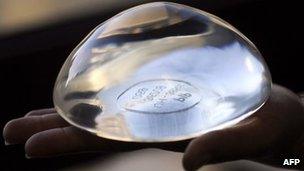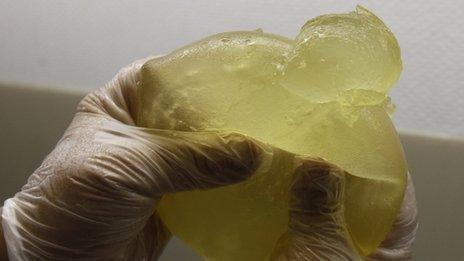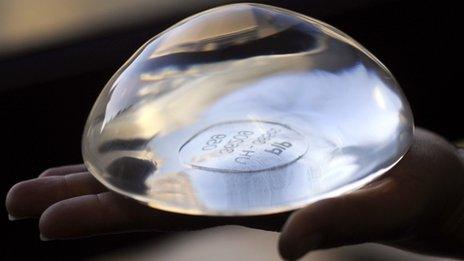PIP breast implants: 'serious lessons must be learned'
- Published
- comments

The implants were manufactured by the French company Poly Implant Prothese (PIP)
A government review, external into the PIP breast implant scandal has found that serious lessons must be learned.
The review was led by Health Minister Lord Howe and examined the role of the Department of Health and the UK regulator the MHRA.
It questions how well women with these implants were informed about the risks.
It says that although the MHRA followed scientific and clinical advice, it should "review and further develop its communications capability."
And it must "obtain evidence from a wider and more detailed set of sources..."
The issue is with safety of silicone breast implants made by the French company Poly Implant Prothese (PIP).
The firm's products were banned in 2010 when it emerged that industrial grade silicone was being used. Implants should be made from medical grade material, which has passed safety tests for use in a human body.
The report says this was a case of deliberate fraud by the PIP manufacturer and regulation alone cannot prevent that.
But it says a "higher level of proactive public communication could have been helpful", especially while awaiting toxicology test results. It suggests a more creative interaction with affected women, perhaps through use of social networking (like Facebook) could have been useful.
In March the Commons Health Committee criticised the government and health regulator for failing to adopt a high profile sooner.
'Serious lessons'
Lord Howe says there is no evidence that the MHRA or the Department of Health significantly failed to do their job.
"But serious lessons must be learned from this scandal. The MHRA needs to look at how it gathers evidence so it is able to identify problems early. It needs to better analyse reports about higher risk medical devices. And it needs to improve the way it communicates with the public."
You can hear my interview with Lord Howe here:
Lord Howe: "In the private clinics... many of the women were left completely in the dark"
Between 2003 and 2010 more than 20 letters were sent from the MHRA to PIP raising concerns about the implants. In hindsight, "this body of evidence could be seen as suggestive of a problematic manufacturer."
The review concludes that regulators in all EU countries need to work better together to support early detection of problems, share the information they gather and take appropriate action to protect patients.
Commenting, the President of the British Association of Aesthetic Plastic Surgeons, Fazel Fatah, said: "Poor post-marketing surveillance of medical devices lies at the root of the PIP crisis. At the BAAPS we feel there needs to be significantly more stringent monitoring of all medical devices including breast implants and all cosmetic injectables, via compulsory, regular reporting of adverse effects and mystery shopping which are all part of our regulation proposals."
cosmetic surgery
Around 47,000 women in the UK have PIP breast implants. Around 95% were fitted privately. A minority of operations were carried out on the NHS, mostly for breast reconstruction following cancer.
Lord Howe's review into PIP implants is one of two set up by the Department of Health in January.
The second review, led by Professor Sir Bruce Keogh, the NHS Medical Director, will look at whether the cosmetic surgery industry needs to be more effectively regulated.
In January Prof Keogh's team concluded there was insufficient evidence to recommend the routine removal of PIP implants. But it recognised the concern that the issue was causing.
It found there was no link between PIP implants and cancer, and the evidence on increased rupture rates was inconclusive.
Throughout the UK any women who had PIP implants fitted on the NHS can get them removed and replaced free of charge.
In Wales the NHS will also replace those of private patients. In England and Scotland the NHS will remove implants of private patients but not replace them.
Latest figures from the Department of Health in England show that 6,632 women with private PIP implants have been referred for hospital checks; 3,865 scans have been completed.
433 women have decided to have the implants removed and 185 have had the surgery.
836 NHS patients with PIP implants have been contacted, 82 scans completed. 214 decisions have been made to remove the implants and 66 women have had this surgery.
- Published28 March 2012
- Published15 March 2012

- Published6 January 2012
- Published10 December 2013
